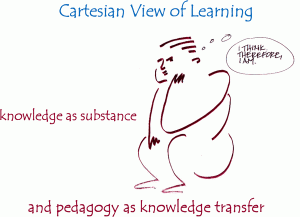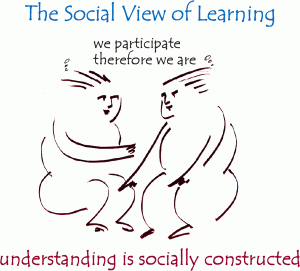Technology + Storytelling + Critical Discourse = Learning 2.0
October 12, 2008
However good they are, web 2.0 technologies are still immature. Watch the editors of Opening Up Education, John Seely Brown, Toru Iiyoshi and Vijay Kumar, speak about the impact and implications of emerging technologies and you’ll see what I mean.
Now, if as it appears, the model of education is changing from one of pedagogy-as-knowledge-transfer to socially constructed knowledge, then it seems to me certain social skills–storytelling and critical discourse–are more important than ever. Otherwise, the opportunity to get together with people from all over the globe is wasted. Recently we’ve begun experimenting with web 2.0 technologies such as wikis, IM, Google Apps at my school. The students quickly master the technologies. They can learn to edit a wiki page without being taught. But they see these things as toys. Teaching them how to use the technology is easy–and will get easier as the technology develops. Teaching them how to think and how to tell a compelling story is, as it ever was and ever will be, immensely more challenging–and immensely more fun.
I can’t think of any more practical tool for the job than philosophy. (It may be a few years away yet, but I think we’ll soon realized what a mistake it was to drop it from the general curriculum so long ago. For a savage critique of Canadian education, read Hilda Neatby’s So Little for the Mind: An Indictment of Canadian Education. Written in 1953 is still largely holds true today.) We’ve been teaching practical reasoning and philosophy to middle school students at Island Pacific School for 14 years. The syllabus covers some formal logic, the structure of argument and fallacies, ethics and a survey of Western philosophy. But we’re an independent school and have more flexibility than any public school.
But the program needs work. I need a better look at non-Western philosophies, among other things. And I need to connect it to storytelling. I do not mean to novel structure, or those zig-zagging plot diagrams. I’m interested in how you teach what a story is, what it does and in why we have stories at all. “Storytelling is one of the few human traits that are truly universal across culture and through all of known history,” says Scientific American has a rather cold account of campfire tales. Richard Rorty says the best answers to our philosophical questions will be found in stories. Interestingly, when I ask my students to tell me their stories, they can’t. “How I spent my summer holidays” just doesn’t cut it. At best that would make a chapter. Even so, but they never write their adventures as if they were chapters. Students often write pedantically, not because they can’t write well, but because they can’t tell stories well. They have no sense of their own lives being part of a narrative, much less any sense of humanity having a narrative. Granted, there is probably something developmental involved here; I think you need meta-cognition before you can write your own story. But I don’t see in any curricula anywhere trying to coax real storytelling out of students at any age. Neither do I see any requiring students to memorize and tell stories. The best place to learn how this will be in something else we tossed out long ago, to our shame: Canadian First Nations culture. Their’s is a living model of socially constructed knowledge passed on through storytelling.
I’m glad to see web technologies develop. But I’d like to see concurrent development of philosophy and of storytelling in language/literature curricula in grade school curricula. Without those two, Learning 2.0 just doesn’t add up.
We Think, Therefore We Are
October 5, 2008
Minds on Fire: Open Education, the Long Tail, and Learning 2.0: an excellent paper on opening up education, or OUE, by John Seely Brown, Visiting Scholar and Advisor to the Provost at the University of Southern California (USC) and Independent Co-Chairman of a New Deloitte Research Center, and Richard P. Adler, Research Affiliate at the Institute for the Future in Palo Alto and Principal of People & Technology, a research and consulting firm in Cupertino, California.
I quite like the distinction Brown and Adler make between the Cartesian and what they call the social view of learning:

(Source: http://connect.educause.edu/Library/EDUCAUSE+Review/MindsonFireOpenEducationt/45823?time=1223153029)
On the other hand, a social view of learning might reawaken intelligent conversation about first things, or faith claims or metaphysics–whatever we want to call those frames of reference that shape all we say and do. First of all, it is about dialogue, which is something structurally different from the essentially one-way communication in the Cartesian model. In dialogue, we seek one of two things: the truth, if it can be known; and if it can’t, which is more often the case, a better understanding of the problem. We come to these by comparing our views with those of others. That simply can’t be done in the Cartesian model.

